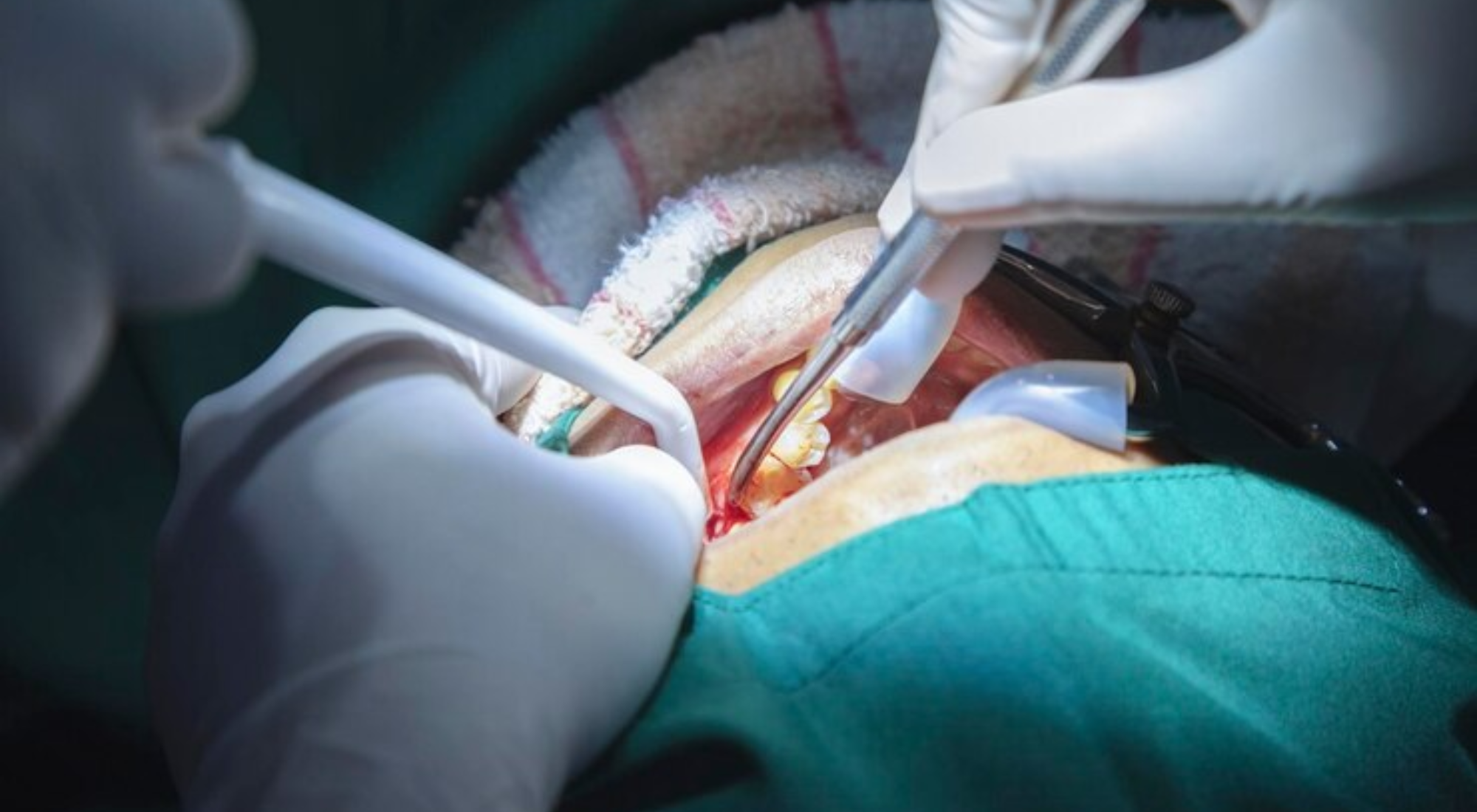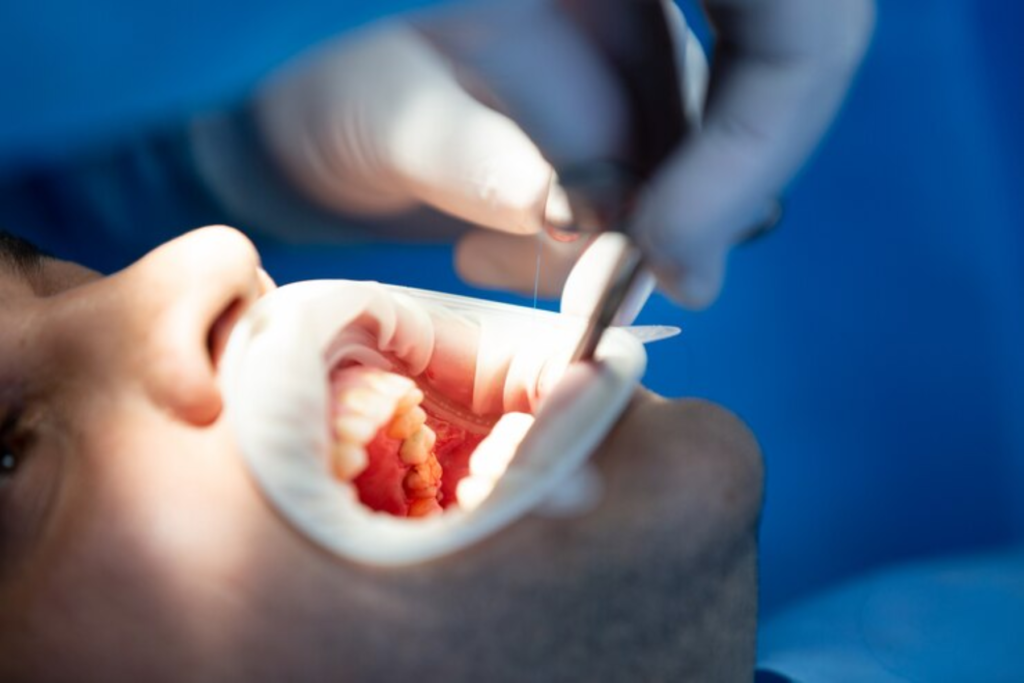Published on April 29, 2024

Wisdom teeth surgery, often a rite of passage in young adulthood, can stir up apprehension due to uncertainty about the recovery process. However, understanding the timeline and what to expect during recovery can alleviate anxieties and pave the way for a smoother experience.
Whether you’re preparing for wisdom teeth extraction or supporting a loved one through the process, arming yourself with knowledge about the recovery process is key to navigating this milestone with confidence and ease. Exploring the nuances of wisdom teeth surgery recovery and equipping ourselves with the tools needed ensure a successful and comfortable recuperation.
In this blog, we delve into the intricate journey of recovery following wisdom teeth surgery. From the immediate post-operative period to long-term healing milestones, we look into recovery timeframes and offer practical insights to empower readers on their recovery journey.
Understanding Wisdom Teeth Surgery
Wisdom teeth, also known as third molars, typically emerge in the late teens or early twenties. However, due to various factors such as limited space in the jaw and misalignment, they often require surgical removal. Here’s what you need to know:
Definition and Purpose
Wisdom teeth are the third set of molars located at the back of the mouth, which may erupt between the ages of 17 and 25. Due to evolution and changes in dietary habits, modern humans often have smaller jaws, leading to insufficient space for wisdom teeth to erupt properly.

Common Reasons for Extraction
- Impaction: When wisdom teeth do not have enough room to emerge fully or at the correct angle, they may become impacted, causing pain and increasing the risk of infection.
- Overcrowding: Wisdom teeth can exert pressure on adjacent teeth, leading to misalignment and crowding in the mouth.
- Potential Complications: Failure to remove problematic wisdom teeth can result in various oral health issues, including tooth decay, gum disease, and cyst formation.
Significance of Post-Operative Care
Proper post-operative care is crucial for a successful recovery after wisdom teeth surgery. Following the dentist or oral surgeon’s instructions, including dietary restrictions, oral hygiene practices, and medication schedules, can minimize complications and promote optimal healing.
Factors Influencing Recovery Time
The duration of recovery from wisdom teeth surgery can vary depending on several factors. Understanding these influences can help manage expectations and promote a smoother recovery process:
Complexity of the Procedure
The complexity of the surgical extraction, such as the position and condition of the wisdom teeth, can affect recovery time. More complicated extractions may require longer healing periods due to increased tissue trauma.
Individual Healing Capacity
Each individual’s healing capacity varies, influenced by factors such as age, overall health, and immune function. Younger patients and those in good overall health may experience faster recovery times compared to older individuals or those with underlying medical conditions.
Adherence to Post-operative Care
Strict adherence to post-operative care instructions provided by the dentist or oral surgeon is crucial for optimizing recovery. Following prescribed medication schedules, dietary restrictions, and oral hygiene practices can expedite healing and minimize complications.
Lifestyle Factors
Lifestyle choices, such as smoking or tobacco use, can impede the healing process and prolong recovery time. A balanced diet rich in nutrients, along with adequate hydration, supports the body’s healing mechanisms and enhances recovery outcomes.
Optimizing Recovery
- Maintain good oral hygiene by gently brushing your teeth and rinsing with salt water as directed by your dentist.
- Stay hydrated by drinking plenty of water to aid in tissue repair and reduce the risk of dry socket.
- Avoid strenuous activities, smoking, and consuming alcohol during the recovery period to promote optimal healing.
Immediate Post-Surgery Period
The immediate aftermath of wisdom teeth surgery can be accompanied by discomfort and side effects. Here’s what to expect and how to manage:
Post-Operative Symptoms
- Bleeding: Some bleeding is normal after surgery and can be controlled by gently biting on gauze pads provided by your dentist.
- Swelling: Swelling around the cheeks and jawline is common and can be alleviated by applying ice packs intermittently for the first 24-48 hours.
- Discomfort: Pain and discomfort are to be expected, which can be managed with prescribed pain medication as directed by your dentist.
Managing Post-Operative Symptoms
- Apply ice packs to the cheeks in 20-minute intervals to reduce swelling and discomfort.
- Take prescribed pain medication as directed by your dentist to manage post-operative pain effectively.
- Avoid strenuous activities and stick to a soft-food diet to minimize irritation to the surgical sites and promote healing.
Importance of Following Instructions
Adhering to post-operative instructions provided by your dentist or oral surgeon is essential for a smooth recovery. Contact your dentist immediately if you experience excessive bleeding, severe pain, or any other concerning symptoms during the immediate post-surgery period.
First Week of Recovery
During the first week after wisdom teeth surgery, the initial discomfort and swelling typically begin to subside as the body initiates the healing process. Here’s what to expect and how to navigate this crucial period:
Recovery Timeline
In the first few days, swelling and discomfort may peak before gradually diminishing. By the end of the first week, most patients experience significant improvement in symptoms.
Managing Discomfort
- Continue applying ice packs intermittently to reduce swelling and alleviate discomfort.
- Stick to a soft-food diet consisting of nutritious options like yogurt, mashed potatoes, and smoothies to avoid irritating the surgical sites.
- Practice gentle oral hygiene by rinsing with saltwater and avoiding vigorous brushing near the surgical areas.
Resuming Normal Activities
While rest is essential for optimal healing, you can gradually increase activity levels as tolerated. Consult with your dentist or oral surgeon before resuming strenuous activities, such as exercise, to ensure it won’t compromise your recovery.
Healing Progression Over Time
Beyond the first week post-surgery, the healing process continues, marked by notable progress in recovery. Here’s what to expect as you journey through the stages of healing:
Closure of Surgical Sites
The surgical sites begin to close, and any dissolvable stitches may start to dissolve or fall out.
You may notice reduced tenderness and improved comfort in the surgical areas.
Gradual Return to Normal Activities
As discomfort subsides and swelling decreases, you can gradually reintroduce solid foods into your diet. Resume regular activities, such as work or school, based on your dentist or oral surgeon’s recommendations.
Patience During the Healing Journey
Lingering symptoms, such as mild discomfort or residual swelling, are normal and should continue to improve with time. Be patient and continue following post-operative care instructions to support the healing process.
Potential Complications and Warning Signs
While complications after wisdom teeth surgery are rare, it’s essential to be aware of potential risks and warning signs to ensure timely intervention. Here’s what to watch out for:
- Infection: Look out for increasing pain, swelling, or pus discharge from the surgical sites.
- Dry Socket: Severe pain, bad breath, and exposed bone in the socket may indicate dry socket formation.
- Nerve Damage: Numbness, tingling, or altered sensation in the lips, tongue, or chin could signal nerve damage.
Prompt Action
If you experience any warning signs or unusual symptoms, contact your dentist or oral surgeon promptly for evaluation and treatment. Follow their recommendations for managing complications and mitigating further risks through proper oral care practices.
Understanding the recovery timeline and factors influencing it is crucial for a smooth journey after wisdom teeth surgery. By considering the factors affecting recovery time and adopting healthy lifestyle habits, individuals can help expedite the recovery process and minimize complications following wisdom teeth surgery. By following these post-operative instructions, managing symptoms, and prioritizing oral hygiene and overall health, individuals can navigate the recovery process with confidence and achieve optimal outcomes for a healthier smile.
